Introduction
We've already discussed Kayo, Armed and Dangerous' armory deck and how this line of products by LSS intends to attract more players to the game. So, let's continue and discuss the second armory deck they released: Ser Boltyn, Breaker of Dawn.
Just like Kayo's deck, this product was designed to introduce new players to the game through a solid deck and give them some room to upgrade it and turn it into a competitive version. However, unlike Kayo's armory deck, Boltyn's armory deck also includes a completely new set of equipment and cards that attracted the eyes of many players - not just beginners.
So, let's understand this hero, this deck's game plan, and how to play with it!
Warrior and the Light Talent

Warrior, as a class, focuses heavily on its weapons and makes them their main win condition. For instance, take a look at Dorinthea Ironsong, her signature weapon, Dawnblade, and how, as a whole, her deck is built around it, with cards, for instance, like Ironsong Pride (1) and Glistening Steelblade (2).
On the other side, Light, as a talent, gives us many tools centered around a hero's soul. It lets us put cards on it or remove them to use stronger effects (we'll explain this in more detail later on), just like Prism, Awakener of Sol does, in a broader way.
However, Boltyn has a unique game style. With his charge mechanic and the Light talent, this Warrior both does a lot with his weapon and also uses many efficient attacks. In a way, he even sets himself apart from the rest of his class because of his talent. Let's see his precon and understand how his midrange game plan is incredibly consistent, as well as quite different from Kayo's aggro game plan.
The Deck
Before we go further, please note that this deck focuses a lot on Boltyn's ability, so we'll go through how it impacts his game mechanics first.

The first part of his ability punishes a few heroes for blocking if you charged that turn, like Dash, Inventor Extraordinaire or Victor Goldmane, High and Mighty.
But, after all, what is charging?
"Charging" means putting, on his soul, one card from your hand. And his soul is nothing more than the cards placed directly below him. It may seem weird, but it will make sense soon. Let's see, for instance, Take Flight (1).

As an additional cost for this card, you can charge your hero's soul, and, as a result, Boltyn's first ability will activate and this card will get an extra effect. In Take Flight (1)'s case, it will get go again, but there are many other types of bonuses you can get by charging.
With our soul, we can pay for our hero's attack reaction ability and give go again to an attack with more power than its base power. With his first ability, we can give go again to the entire combat chain if our opponent decides to block.
So, a Boltyn turn includes attacking while charging, then giving him go again and attacking a second time - with either his weapon, Raydn, Duskbane, or Snatch (1).
We can divide this deck into three parts: cards with charge, finishers, and other cards.
Cards with Charge

Cards with charge are this deck's main engines, and are essential if you want to play any decent turn. Each of them has a bonus effect if you charge, but they all also have the same goal: activate your hero's first ability. Furthermore, charging feeds your soul and lets you activate Boltyn's second ability. We'll see soon that this is not the only way to feed his soul, but it is the most common.
By the way, allow me to explain why this deck doesn't include any blue cards. First, its curve is quite low (most cards cost 0 or 1 resource), and some interact with yellow cards (not unusual for the Light talent). For instance, Beaming Bravado (1) gains 1 power if you charge a yellow card, but that's not the only example. When we get to our equipment, you'll once again see how important yellow cards will be for this deck.
All extra effects are quite relevant: Beaming Bravado (1) will have more power than its base power, and thus you'll be able to give it go again with Boltyn's ability. Bolt of Courage (1) will draw you an extra card from your deck or arsenal if you charged that turn, and Engulfing Light (1) will feed your soul. Express Lightning (1) will have an above-average value, and Light the Way (1) and Take Flight (1) will gain go again without relying on your hero.

V of the Vanguard (2) is the best attack with charge in the deck. Besides letting you put any number of cards on your soul, this attack will buff itself and every card in the combat chain. This means you'll be able to activate your hero's ability and thus play a sort of "Art of War (2) in attack-form.
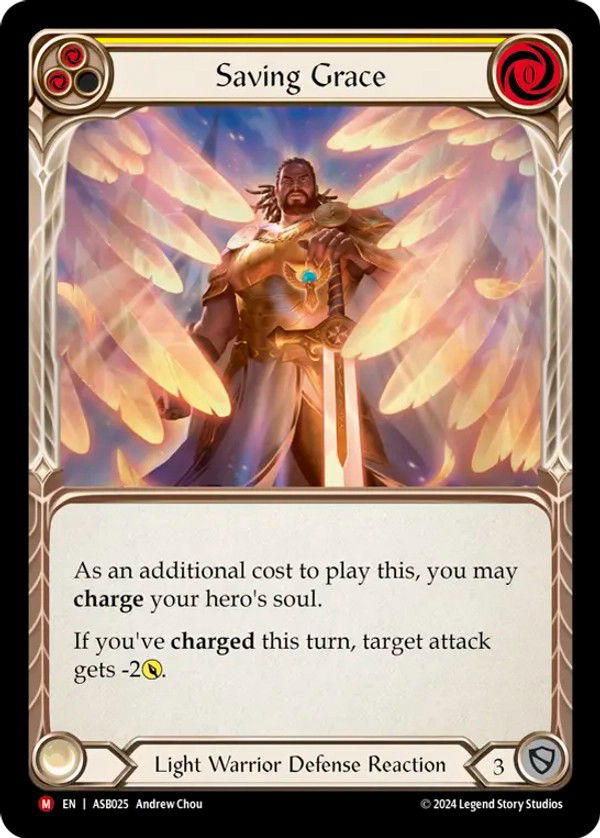
But we don't have to play offensively if we want to charge. One of the exclusive cards in this precon, Saving Grace (2), lets you charge and turns into a defense reaction that protects you from five damage (which is above average for yellow and for a zero-cost card).
Finishers
Finishers are excellent when played last - either because they don't have go again or because they'll be your "element of surprise".
Snatch (1), one of these iconic cards, seems to be a bit lost in this list (as it is generic and doesn't have a talent), but its cost and on-hit effect makes it a nearly essential attack. Valiant Thrust (2) is a great attack to finish your turn because of its high power and low cost. Keep in mind that, as its power will be higher than its base power, you can also give it go again with your hero.

Another excellent finisher is Raydn, Duskbane. As Boltyn leans more midrange (so, he blocks a bit and attacks a bit every turn), it will give you very solid turns.
Unlike super aggressive decks that always want to attack with a full hand, Warrior is happy to attack with charge, give it go again, and finish the turn with their weapon. And you can do even more if you have more cards, as you can give your weapon go again, but keep in mind that ending your turn with it is never a bad play.

Lumina Ascension (2) isn't exactly a finisher, but is certainly the best card in the deck, and, with it, we'll be able to set up a devastating turn.
It does absolutely everything this deck wants: it lets you attack with your weapon another time on your turn, buffs its power, feeds your hero's soul, and is one of the best ways to gain some life. It's not unusual to find some Boltyn players using a more combo-centric list that focuses on playing two Lumina Ascension (2) to win the game. This shows how impressive this action is, and how it was a great decision to include it in this precon.
Other Cards
The other cards in this deck are more specific; they either support Boltyn's dynamic or charge as a mechanic.
Banneret of Resilience (2) and Banneret of Vigor (2) are the best cards you can put on your hero's soul through charge. As attacks, they are not that great (even though they block for 3), but, when you put them on your hero's soul, you'll get a bonus. We'll see further on that there are more "Banneret" cards like this with better effects.
Courageous Steelhand (1), Resounding Courage (1), and Battlefield Blitz (2) all interact with charge. They are more offensive and buff your hero when you have a full hand that turn.
And, lastly, we have Sink Below (1) as the final card in this deck's defensive package. The fact you can swap a card in your hand with another may fix turns whenever you can't charge anything or don't have any yellow cards.
Equipment
Unlike Kayo's deck, Boltyn's armory deck includes an exclusive equipment kit. A few of these cards enabled new ways to play with him, and others were immediately added to competitive lists.
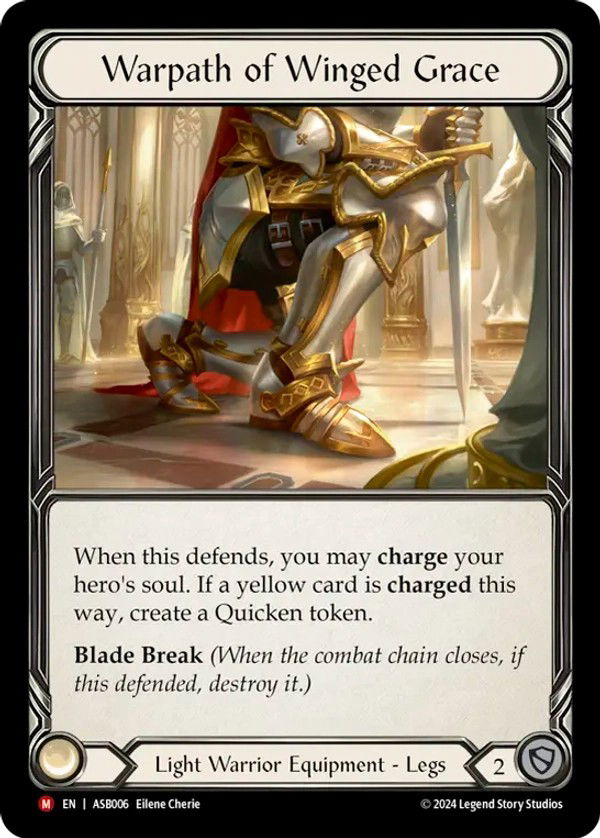
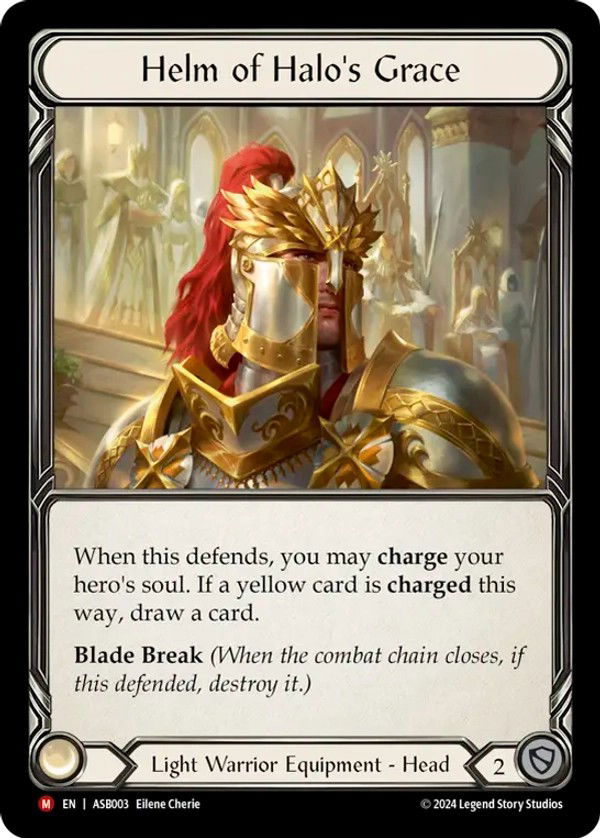
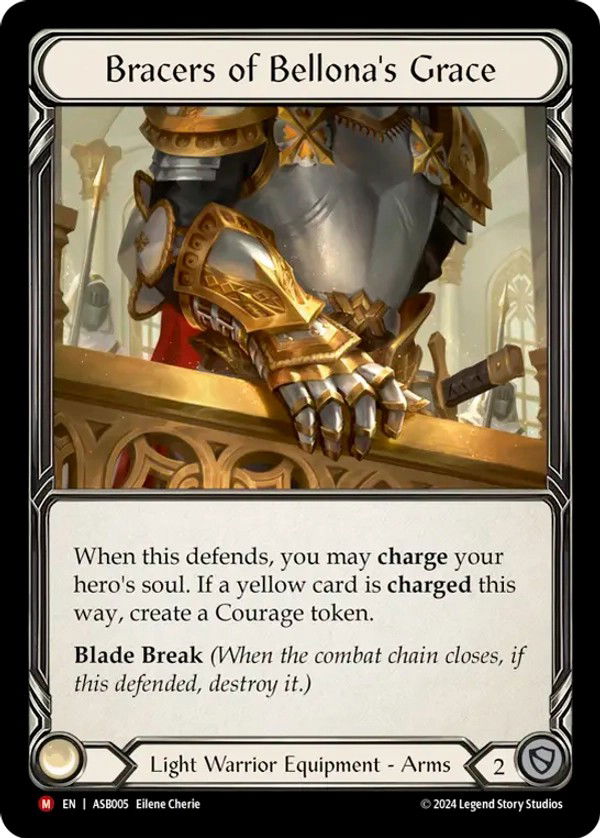
Bracers of Bellona's Grace, Helm of Halo's Grace, and Warpath of Winged Grace all essentially do the same: they have blade break 2 and let you charge your hero's soul when you defend yourself with them. If you do, each one will give you an extra bonus, and they're all incredibly useful for this deck's strategy.
The head piece fixes your hand, like Crown of Providence. The arm piece gives you Courage, so it lets you set up your first attack already with more power than its base power, and the leg piece gives you a Quicken (and thus lets you give go again to your first attack).
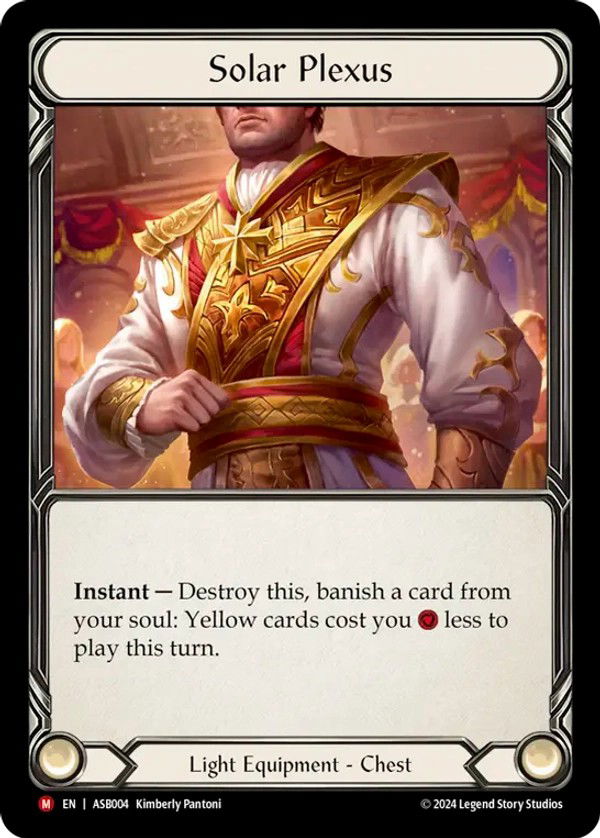
Solar Plexus deserves a deck of its own. In this precon, it will let you set up big turns by making cards like Battlefield Blitz (2) and V of the Vanguard (2) cost zero, but you can change this deck to get 100% out of this chest piece.
We won't do that today, but it is important to note how powerful this precon equipment can be.
Tips
Before we tell you how you can upgrade this deck, let's see the main strategies in it:
- The main strategy involves using an attack with charge, giving it go again with your hero, and attacking with his weapon. With better hands, you can also give go again to his weapon and play a finisher, like Snatch (1).
- Manage your soul well. You can't activate your attack reaction without your soul.
- This deck is not aggressive, and you don't always need a full hand for a good turn. Usually two cards, or one in your hand and your arsenal, will give you a relatively decent turn.
- Lumina Ascension (2) and V of the Vanguard (2) are the best tools in the deck. Look for the best lines you can set up to make the most out of them.
How to Upgrade It
Of course, like any precon, it is not thoroughly refined and needs some upgrades, so let's see which are the best ways to upgrade it, and, finally, what a competitive version of it looks like.

The first card we can add is definitely Beacon of Victory (2). This attack reaction not only can buff "infinitely" an attack that might win you the game, but is also a tutor for Lumina Ascension (2). This way, you'll be able to set up more powerful turns early on.

Another important addition is Spirit of Eirina (2). This legendary item is incredibly valuable, as you don't need to play it from your hand, and it also lets you play Lumina Ascension (2) at instant speed. As this card has go again, playing it as an instant will give you an action point, so you'll have two action points (the one you got in that turn and the one Lumina gave you). This means you'll be able to attack more times without using your hero's ability.

Soul Shield (2) is the best staple in any Light deck. It blocks incredibly well, is a yellow card, and goes to your soul after the combat chain resolves. This will be incredibly useful for Boltyn.

You should also replace the Banneret cycle for more useful cards. Banneret of Courage (2) and Banneret of Gallantry (2) give incredibly relevant tokens for this deck's strategy. While Courage already enables your hero's attack reaction, Quicken gives one of your attack's go again.
These are not the only cards you can add to this deck to upgrade it. Fyendal's Spring Tunic, Command and Conquer (1), and Ironsong Versus are a few of them, but let's see what a competitive version of it looks like, and how you can make the most out of this precon.
This is Isaac Ward's list, who got to top 8 at the Battle Hardened: Bali. Notice that this list also plays the new cards Warpath of Winged Grace and Saving Grace (2).
Furthermore, this deck still has the same strategy as the precon and uses, as win conditions, V of the Vanguard (2) and Lumina Ascension (2). Obviously, the player added more cards to improve the deck's consistency and power, but the precon itself is already a great base for this type of deck.
Final Words
Armory decks have been an astonishing success and pleased most of the community. While Kayo, Armed and Dangerous's precon was criticized for being too simple, Ser Boltyn, Breaker of Dawn's precon includes a great set of cards and was highly praised for including his specializations - the deck's main win conditions. Furthermore, its equipment set is great and has already been included in competitive lists, which made this deck even more relevant competitively.
What did you think of this precon? Tell us your thoughts in our comment section below.
Thank you for reading, and see you next time!









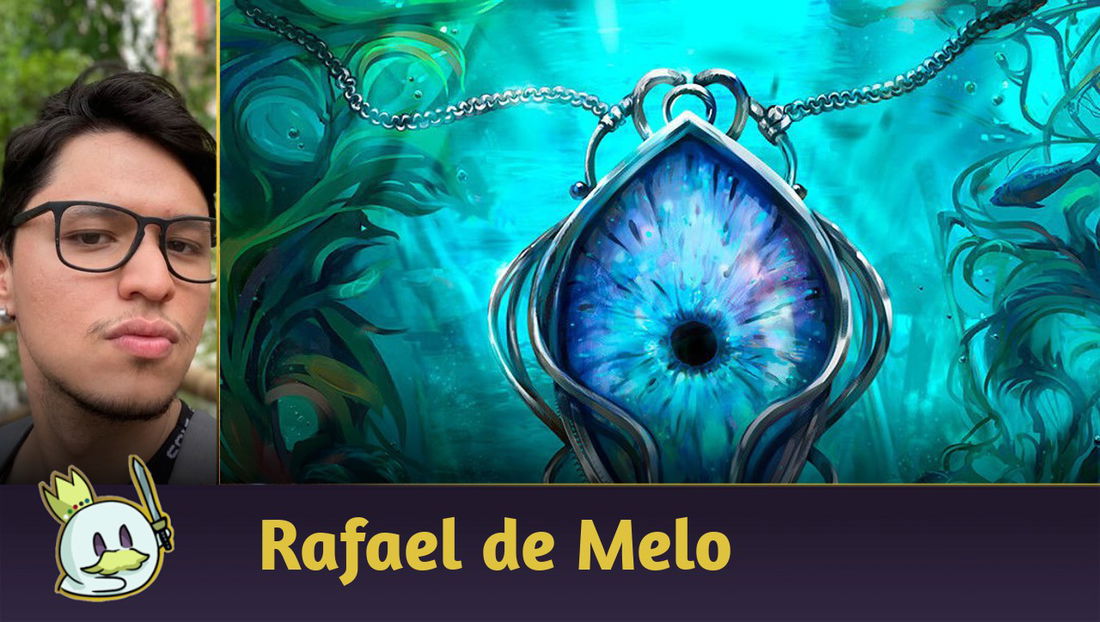
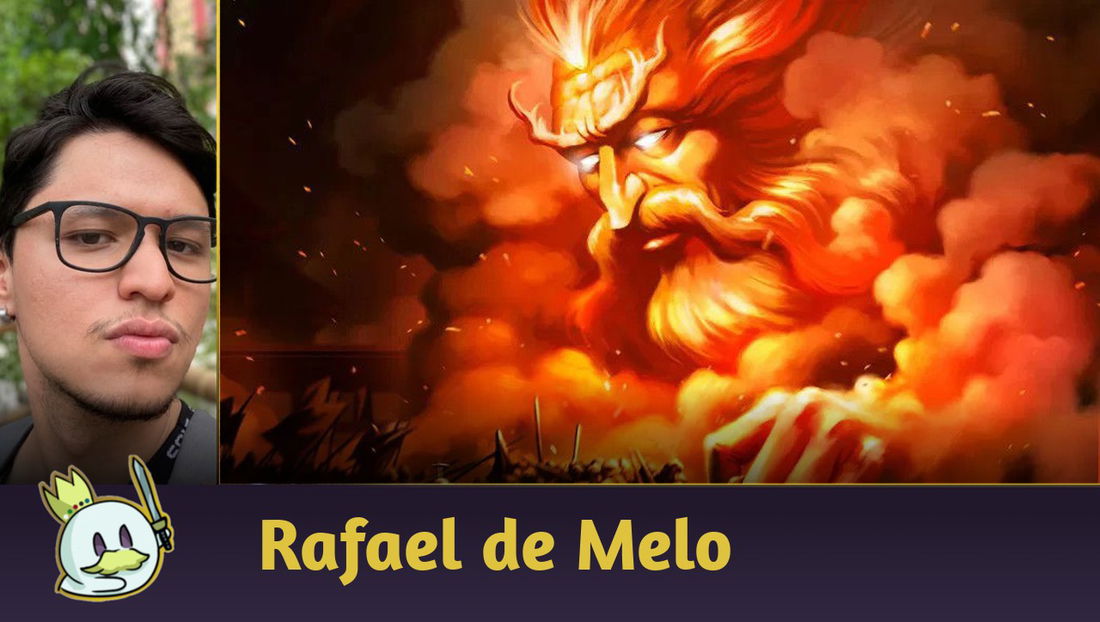



— 코멘트 0
, 반응 1
첫 댓글을 남겨보세요